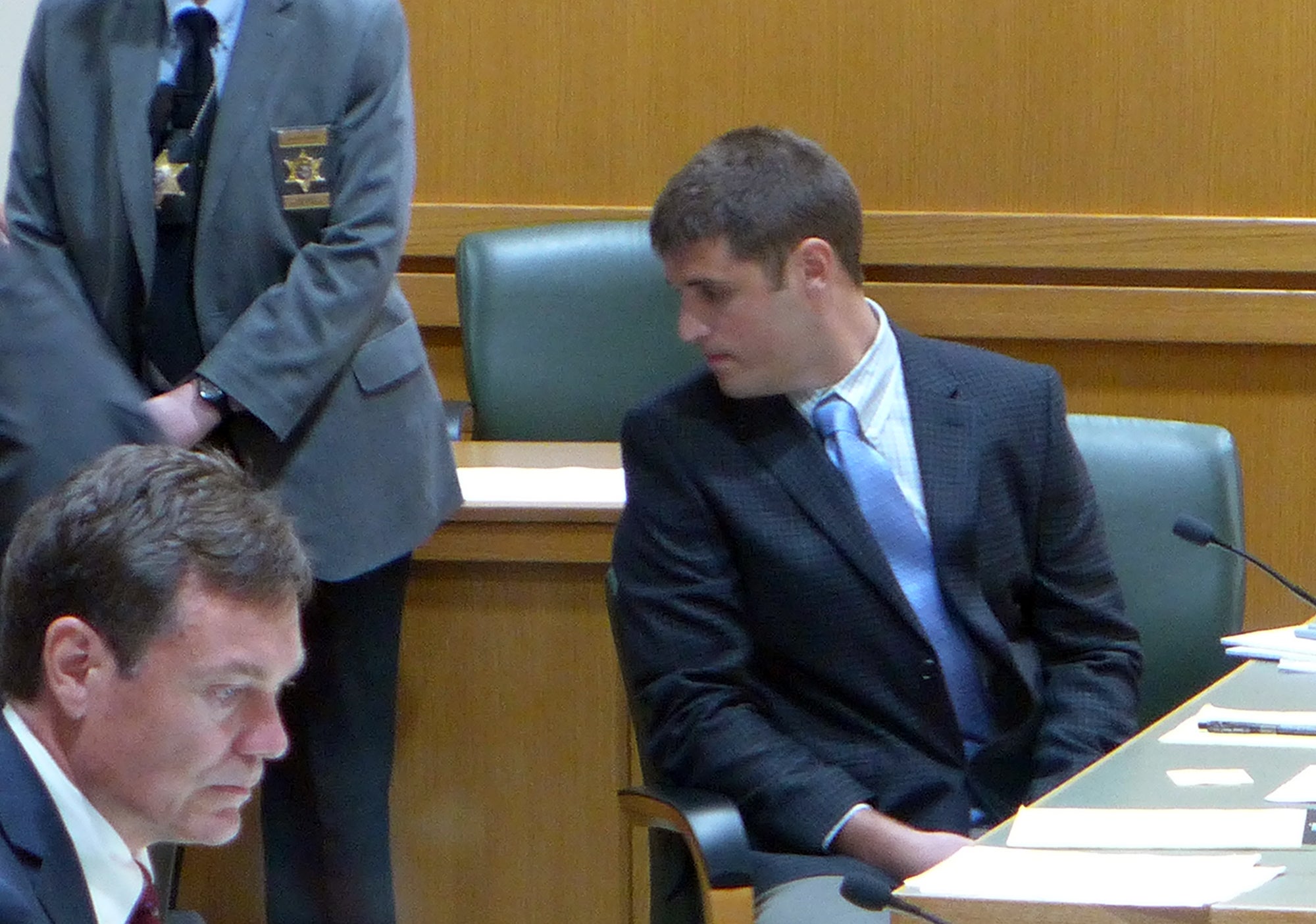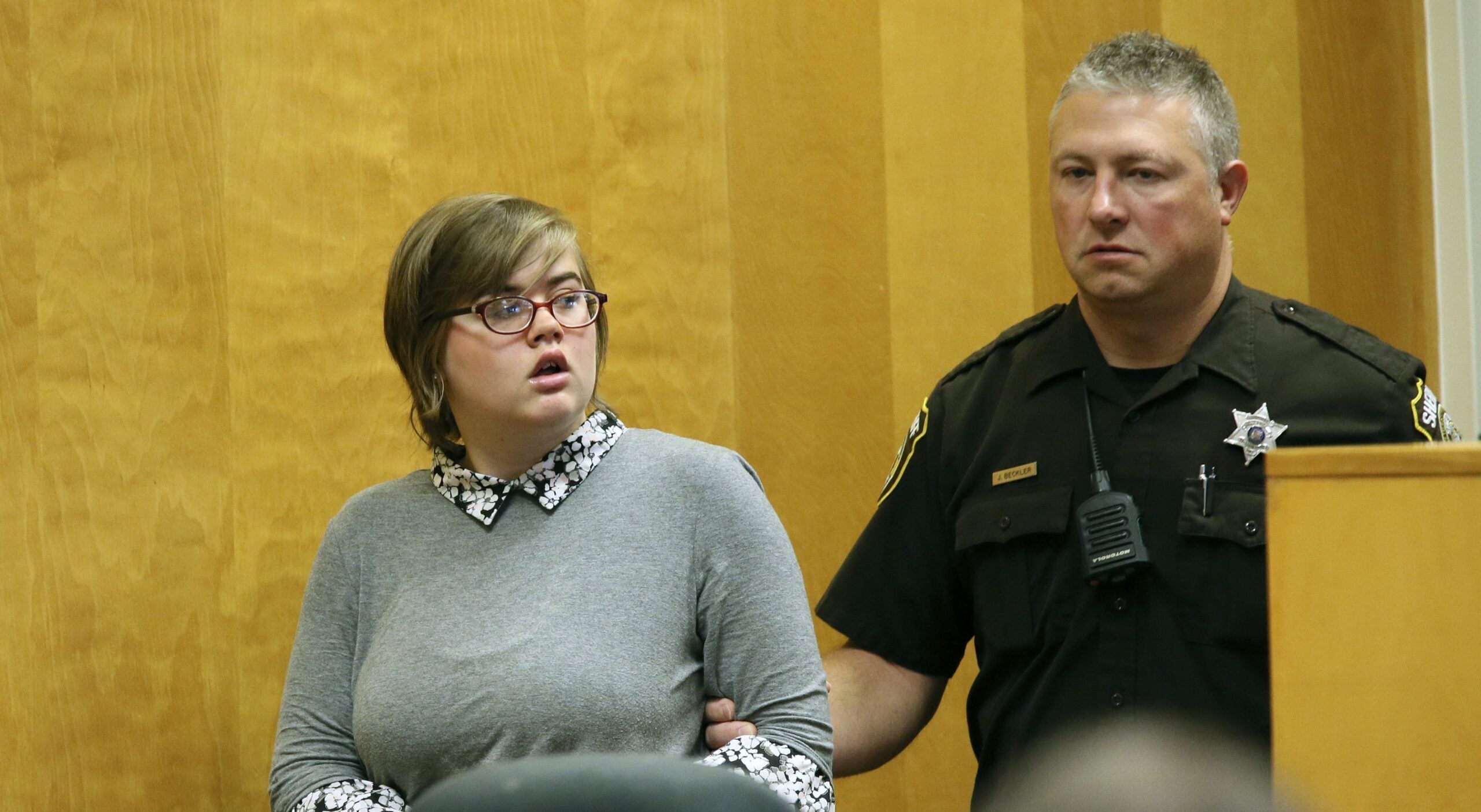A former University of Wisconsin-Madison student was sentenced Thursday by a Dane County judge to three years in prison followed by eight years of state supervision for a string of sexual assaults near campus that a prosecutor characterized as a “campaign against women.”
During the sentencing hearing for 22-year old Alec Cook of Edina, Minnesota, Judge Stephen Ehlke said Cook’s actions were “very grave offenses.”
“I hope this sentence brings some additional healing,” Ehlke said.
News with a little more humanity
WPR’s “Wisconsin Today” newsletter keeps you connected to the state you love without feeling overwhelmed. No paywall. No agenda. No corporate filter.
The Dane County courtroom was packed when the mother of one of the UW-Madison students asked for justice and reconciliation.
“There is a lot of pain in this room. It could be a grandmother’s pain, a mother’s pain, father’s, uncle’s, son’s, brother’s, sister’s, friend’s and then most importantly, the victim’s,” she said. “I acknowledge my heart absolutely aches for Alec’s family as well. As parents we want the best for our children.”
Cook cried while addressing the court Thursday.
“I’m sorry. I was wrong. You told the truth and everyone should believe you. This is my fault. You didn’t deserve this neither did your families,” Cook said.
While several young women who reported being assaulted or stalked by Cook wrote statements to the court, only one took the stand. The young woman related how she took different routes to class to avoid Cook and how it has had a lasting effect.
“If there is a man who walks close behind me even in daylight, I will hold my breath and pray he won’t touch me,” she said.
The first student to go to police had her statement read by Jaime Sathasivam from the Dane County Rape Crisis Center. She described Cook as a charming and outgoing stranger in their initial encounter on a Madison street where she was riding her bike and he latched onto her seat while skateboarding behind her. She compared their first interactions to a romantic comedy but said it changed after he lured her to his apartment and violently assaulted her.
“No sentence can give my life back; it can, however, protect his past and future victims … He’s a danger to society and must face significant punishment for the lives he’s destroyed,” said Sathasivam reading from the victim’s statement.
The conclusion of the case against Cook comes three years after the first assault was reported.
When the first UW-Madison student went to police and charges became public, 10 other women came forward to accuse Cook. Cook was arrested in October 2016 and expelled five months later.
There was no criminal trial because Cook pleaded guilty in February to felonies involving five women: Three counts of third degree sexual assault and one count each of strangulation and stalking. Eighteen other charges were dropped as part of the plea deal. Cook faced a maximum sentence of close to 40 years in prison. Prosecutors pushed for 19 years while the defense requested probation.

Alec Cook after his 2016 arrest. Dane County Sheriff’s Office
William Merrick, a psychologist for the defense who assesses people under Wisconsin’s sexual predator law, described Cook as a narcissist who used hallucinogenic drugs along with marijuana and had sexual sadism disorder. The psychologist said Cook didn’t deny his diagnosis.
“He was very forthcoming, offering me details and thoughts and fantasies that were notable knowing he was facing these charges,” Merrick said.
Merrick also testified that Cook was considered to be at low- to moderate-risk to reoffend if he had the proper treatment and said a long sentence would increase the chances of recidivism.
But Assistant Attorney General Christopher Liegel, one of the prosecutors in the case, asked whether Cook was receptive to treatment and the psychologist said, during his assessment, he was not.
Cook’s parents, in a letter to the court, said they believed in holding people accountable for their actions but also believe in the power of redemption.
“With treatment, supervision and sobriety we sincerely believe Alec will never re-offend,” they wrote.
In a statement to the court prior to sentencing , one UW-Madison student wrote she had been, “violated by someone I believed I should have been able to see through.”
The mother of that young woman described in a letter how her daughter moved home, dropped college classes, quit her job and retreated from friends and family. She asked the judge in a letter to impose the maximum sentence
“I find absolutely no pleasure in prison time and my feelings are not fueled by a need for revenge or a desire for justice. On the contrary, I feel pain for his mother and father. I’m sure it is impossible for them to imagine that someone they love deeply could be so morally lost,” she wrote.
Prior to their son’s sentencing, Cook’s parents wrote they believed the victims and that “our son took from you what was only yours to give. He was wrong, and we are sorry.”
One woman wrote in a victim impact statement how she got a pepper spray bracelet as a graduation present instead of a silver bracelet after repeatedly dodging encounters with Cook at the library and grocery store. Her name was in a journal police found in Cook’s apartment allegedly detailing the women’s features and what he wanted to do to them. That notebook was not allowed as evidence; the judge ruled police has obtained it improperly.
The woman wrote that she hoped the press would focus not on Cook but on the “strength and resilience of me and the other victims involved in this case.”
During sentencing arguments, Cook’s defense attorney, Jessa Nicholson Goetz, said the young women are “not tethered to the word victim” and Cook shouldn’t be turned into an example.
“Damage is not irreparable. If they choose to, they can go on to fall in love. They can go on to have healthy, life-affirming relationships,” Nicholson Goetz said.
Wisconsin Public Radio, © Copyright 2026, Board of Regents of the University of Wisconsin System and Wisconsin Educational Communications Board.





